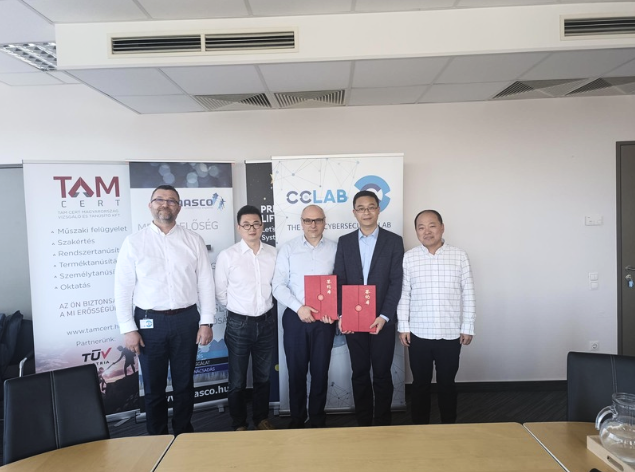Strategic Partnership for Cybersecurity – CCLab and WonSec Technology Join Forces for EUCC Certification
3
min reading time
On March 21, 2025, a special event took place at CCLab’s headquarters in Budapest, Hungary: we had the pleasure of welcoming the delegation of WonSec Technology, and together we signed a strategic cooperation agreement focused on the EU Cybersecurity Certification Scheme on Common Criteria (EUCC).
This partnership marks a milestone not only for CCLab but for the broader European certification ecosystem as well. Our joint goal is to support the secure and compliant entry of ICT products and services into the European market, especially in light of the soon-to-be mandatory EUCC requirements.

Why does EUCC matter?
The EUCC (EU Cybersecurity Certification Scheme on Common Criteria) is the European Union’s new cybersecurity certification framework, set to gradually replace fragmented national schemes starting in 2025. Its purpose is to establish a unified, high-security standard for ICT products across the EU. Built upon the international Common Criteria standard, EUCC strengthens requirements around data protection, supply chain security, and vulnerability analysis - raising the bar for manufacturers and developers worldwide.
CCLab and WonSec Technology: combining expertise across continents
CCLab is among the first evaluation facilities officially authorized by the EU to conduct EUCC assessments. With over a decade of experience in Common Criteria evaluations and consultancy, we are proud to support global clients with a trusted and professional approach.
Our partner, WonSec Technology, is a leading digital security and certification provider in China, with extensive experience and technological strength. Through this collaboration, we aim to jointly assist manufacturers and developers preparing for the European market and striving to meet the demanding EUCC criteria.

Building a safer digital future together
This agreement is more than a partnership, it is a shared commitment to global cybersecurity. We believe that international cooperation and knowledge exchange are essential to building a secure and sustainable digital economy.
At CCLab, we remain committed to delivering reliable, high-quality certification services in cooperation with our partners - not only in Europe, but worldwide.
Related downloadables
Related downloadables


EUCC Study - The New European Union Cybersecurity Certification Scheme
EUCC Study - The New European Union Cybersecurity Certification Scheme
Download EUCC Study 2024 for the most important and up-to-date information about the new European Union Cybersecurity Certification Scheme


Guide and Checklist for Common Criteria Evaluations - updated with EUCC Scheme
Guide and Checklist for Common Criteria Evaluations - updated with EUCC Scheme
Learn everything you need to know for a successful Common Criteria certification project. Save costs and effort with your checklist.
Related news

Strategic Partnership for Cybersecurity – CCLab and WonSec Technology Join Forces for EUCC Certification
On March 21, 2025, a special event took place at CCLab’s headquarters in Budapest, Hungary: we had the pleasure of welcoming the delegation of WonSec Technology, and together we signed a strategic cooperation agreement focused on the EU Cybersecurity Certification Scheme on Common Criteria (EUCC). This partnership marks a milestone not only for CCLab but for the broader European certification ecosystem as well. Our joint goal is to support the secure and compliant entry of ICT products and services into the European market, especially in light of the soon-to-be mandatory EUCC requirements.
3
min reading time

The Future of EUCC Certification for ESG Software
As the demand for corporate accountability continues to surge, Environmental, Social, and Governance (ESG) software has taken center stage in how companies collect, manage, and disclose sustainability data. With regulatory frameworks tightening across the EU and globally, ESG software vendors must now consider cybersecurity not just as a technical necessity but as a cornerstone of ESG integrity. At the heart of this transformation is the EUCC (European Union Cybersecurity Certification) framework—an emerging standard that ensures the secure design, deployment, and maintenance of digital products, including ESG platforms. In this article, we’ll explore why EUCC certification is becoming a critical benchmark for ESG software, how it reinforces security and compliance, and how CCLab can streamline the path to successful certification.
8
min reading time

How the Common Criteria Guide Helps Navigate Complex Evaluation Requirements
Achieving Common Criteria certification is a crucial step for developers and organizations aiming to demonstrate the security and reliability of their IT products. However, the certification process is known for its complexity, requiring strict adherence to extensive documentation and evaluation protocols. Developers often face challenges in understanding intricate requirements, structuring their submissions, and ensuring compliance with rigorous standards.
6
min reading time
